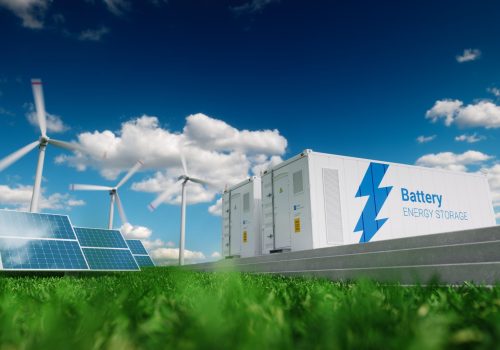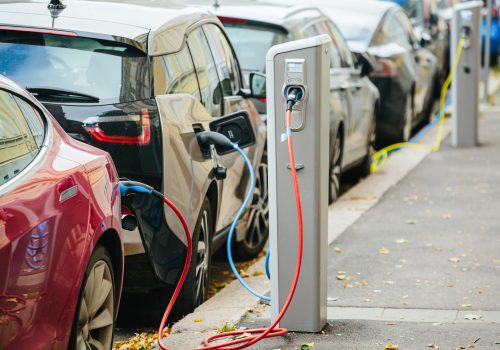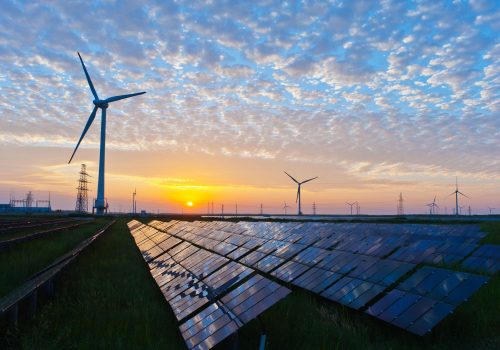This is part of an essay series on the mutual challenges posed by climate change and opportunities presented by the energy transition that the Gulf Cooperation Council (GCC) and Turkey share.
Recently, countries have reached a point at which energy transition coincides with climate goals, economic growth, national interests, and sustainability. In the Gulf Cooperation Council (GCC) region, no country can self-achieve energy transition; thus, nations should plan on how to join forces for diversifying energy sources and reducing carbon footprints in the region. The prospects for cooperation for a sustainable future between the GCC and Turkey center on increasing adoption of renewable energy, offshore wind, solar energy, nuclear power, and clean hydrogen in agriculture, manufacturing, and transportation.
Cooperation in energy transition
The GCC countries and Turkey have a chance to cooperate in energy transition for a sustainable future by promoting international agreements based on mutual interests, as well as the principle of and belief in a just energy transition for all. Turkey has been an energy-dependent country and enjoys a constantly growing market. On the other hand, GCC economies have benefited from oil and gas exports for the past fifty years. There is an opportunity for these regional actors to work together, spearhead the region’s transition to clean energy, and make joint efforts toward meeting their climate goals. Nevertheless, each country in the region has unique challenges and opportunities. There is an opportunity to ensure an energy transition that is inclusive, responsive, flexible, rational, and digital. The aim here is for nations to reduce their reliance on fossil fuels and combat the adverse effects of climate change. These countries understand and appreciate the importance of adopting renewable energy, and they can do that by coming together to invest in feasible, productive projects.
Climate change and agriculture are another opportunity for cooperation between the GCC and Turkey in terms of the energy transition. Notably, the UAE and Turkey have embarked on multiple recent collaborations to address climate change and foster environmental sustainability. In February 2022, the two nations signed multiple agreements and memoranda of understanding (MoUs) aimed at promoting their cooperation and collaboration on climate and environmental issues. Such agreements demonstrate that the two nations have decided to work together to support the global transition to climate neutrality. Specifically, GCC countries and other actors should have a common vision of international cooperation in terms of sharing best practices in the energy transition and addressing their unique challenges to ensure a sustainable future. Cooperation can take many forms, one of which is a joint investment in research facilities and sharing scientific knowledge sources and collaborative projects that aim to improve existing technologies in the energy transition field. Also, promoting the exchange of experts and professionals that would enable knowledge-sharing and capacity building. Training programs can be established to facilitate the transfer of expertise with the focus on energy policy and efficiency.
Joint climate action in the GCC and Turkey
The Middle East is among the world’s most vulnerable regions to the accelerating impacts of human-caused climate change, due to effects ranging from heat waves to rising in sea levels and water scarcity. The Gulf nations face depleted freshwater resources within the next 50 years, while average temperatures are soaring at a rate that is two-to-seven times faster than the global average – it is no surprise that the region is home to 12 of the world’s 17 most “water stressed countries”. There is a huge opening for them to come together and adopt clean-energy sources that can signal a transition from fossil fuels to clean sources of energy.
Climate change has also adversely affected the countries’ economies and political stability. There is an enormous chance for the GCC, Turkey, and related actors to collaborate on future joint actions to address climate-change issues—including water and air pollution, sandstorms, and flooding—with the goal of preserving the nations’ economic stability and social resilience. Such countries should be driven by their strong commitment and goodwill toward ensuring economic diversification and phasing out of fossil fuels in order to ensure the preservation of stability and the attraction of foreign direct investment. For instance, Turkey and countries in the GCC—including the UAE, Bahrain, Qatar, Kuwait, and Oman—have a chance to use cooperation on climate action and the energy transition as the chief drivers for regional reconciliation.
GCC nations and Turkey can pledge to work jointly to implement lucrative projects in renewable energy. For instance, the UAE, Qatar, Saudi Arabia, and Turkey recently signed a strategic partnership and framework agreement in the area of green and natural resources. The “Zero Waste Blue Project,” aimed at keeping gas and water resources free from waste, is an area of prospective cooperation in the Middle East. Furthermore, the Arab-China Business Conference that was conducted in Riyadh concluded that $10 billion should be used in the construction of energy-transition projects in the GCC such as electrification of transport. Additionally, leading Emirati corporations have invested in projects that benefit both the GCC and Turkey, with AED1.8 billion ($490 million) committed toward the energy transition. Other collaborations in the GCC to mitigate climate change and its adverse consequences should take place in the areas of transport, commerce, and manufacturing such as expansion of smart buildings and paperless trading through digitization. These initiatives, when explored, would lead to the construction of carbon-free airports and green railway stations powered by wind and solar energy, and car factories powered using green initiatives.
Looking ahead for a just and sustainable transition
The GCC and Turkey have the opportunity to come together and dedicate resources to diversify energy sources and transition from the use of fossil fuels to the use of clean energy. In the field of agriculture, the Middle East region should cooperate to mitigate adverse effects of climate change, such as droughts, sandstorms, and floods that affect the growth and maturity of food crops. Moreover, in the areas of green and renewable resources, these nations can commit to dedicating financial resources and efforts toward energy-efficient projects that would lead to the adoption of carbon-free and green industries and infrastructural projects.
Mouza Almarzooqi is the Head of Economic Studies section at TRENDS Research and Advisory
Further reading
Fri, Dec 8, 2023
How GCC and Turkey can go together toward a sustainable future
Report By Eser Özdil
While Turkey has ambitious green-energy transition strategies and projects, they need to cooperate with the GCC to overcome the financial and capacity challenges.
Fri, Dec 8, 2023
EV adoption could drive collaboration for renewable energy in Turkey and GCC
Report By
Turkey and the GCC have ambitious environmental targets. Here is how a collaboration on renewable energy and EV adoption can help with achieving those targets.
Fri, Dec 8, 2023
Charting energy transitions in the Eastern Mediterranean and Arabian Peninsula
Report By
While Turkey and the GCC have different renewable energy motivations, they need to evolve and combine experience and resources for energy security and sustainability.
Image: Photo by Biel Morro on Unsplash




Follow the conversation on X, formerly known as Twitter, with @AC_Istanbul and @AtlanticCouncil using #ACTurkey and #ACatCOP28